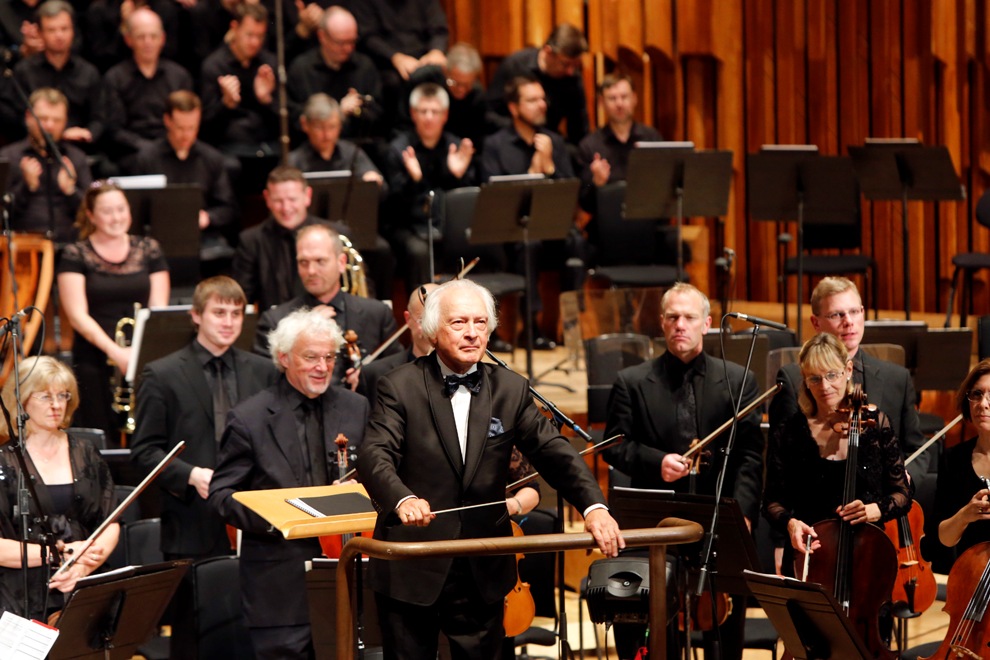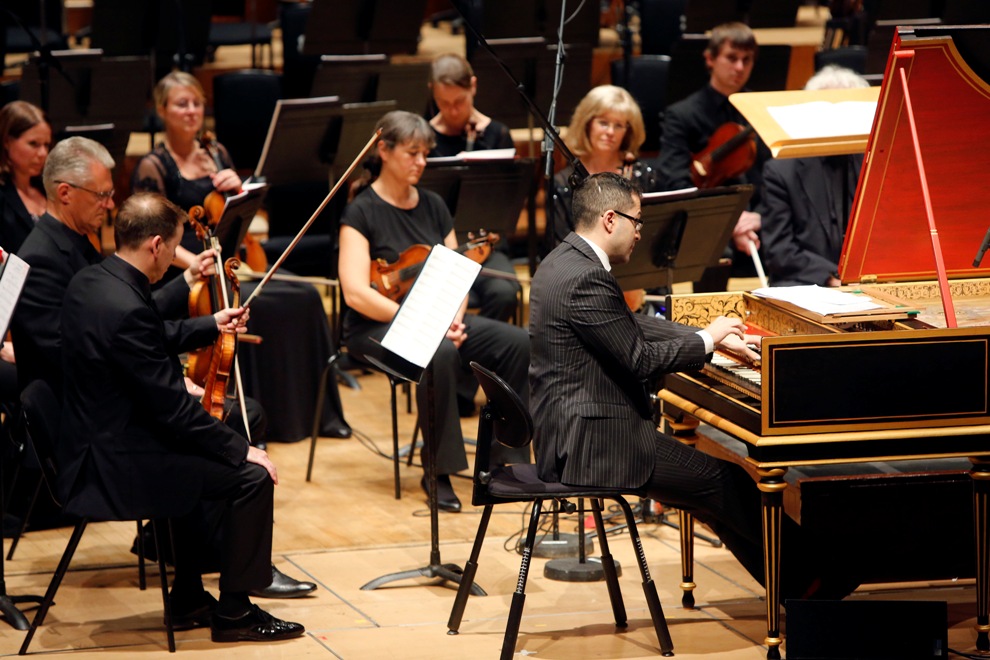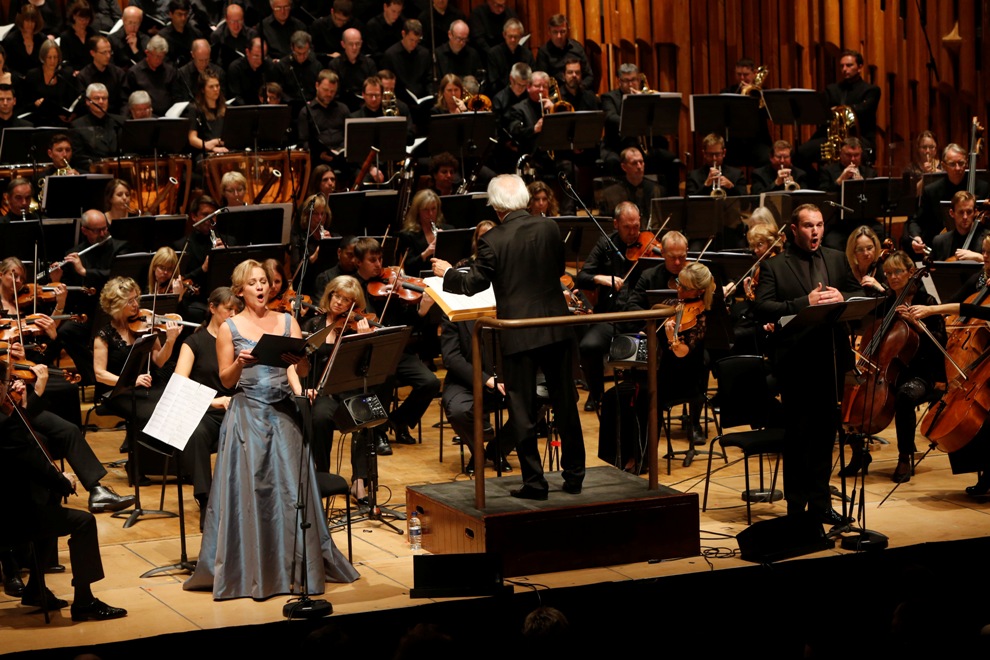Total Immersion: Henryk Górecki, Barbican | reviews, news & interviews
Total Immersion: Henryk Górecki, Barbican
Total Immersion: Henryk Górecki, Barbican
The Polish composer well served by excellent performances but let down by poor programming

This was Henryk Górecki beyond the Third Symphony. His otherwise ubiquitous masterpiece was notable by its absence from yesterday's programme. That was surely a conscious decision, and a wise one, allowing his many other important works to come out from its shadow. Górecki turned out to be an ideal subject for the BBC Symphony Orchestra’s “Total Immersion” treatment.
The range of genres in which Górecki worked, and excelled, meant that each concert could only give a taste of each. Chamber music was represented in the lunchtime concert with the First and Second String Quartets performed by the Silesian Quartet at St. Giles’ Cripplegate. Churches don’t usually make good venues for chamber concerts, but here the spacious sound seemed ideal. In both works, Górecki moves between huge expansive gestures and quiet whispers, and both were given an appropriate sense of scale by the aura of the acoustic.
 Most of the players in the Quartet had worked with the composer on this music, and their understanding of the style was evident in every bar. These works date from the late 1980s and early 90s, a time when Górecki’s music had reached it most austere extremes. Individual notes, or alternating couplets, are repeated for minutes on end. The music stops suddenly, and then after a pregnant pause will continue undeterred. Folk-inspired melodies appear over the uniform textures, but then devolve into similarly repetitious lines without ever quite risking sentimentality. This Total Immersion experience began at the deep end, with music that posed far more questions than it answered.
Most of the players in the Quartet had worked with the composer on this music, and their understanding of the style was evident in every bar. These works date from the late 1980s and early 90s, a time when Górecki’s music had reached it most austere extremes. Individual notes, or alternating couplets, are repeated for minutes on end. The music stops suddenly, and then after a pregnant pause will continue undeterred. Folk-inspired melodies appear over the uniform textures, but then devolve into similarly repetitious lines without ever quite risking sentimentality. This Total Immersion experience began at the deep end, with music that posed far more questions than it answered.
The second concert of the day was given by the BBC Singers, again of music from the 1980s. Górecki had known Karol Wojtyła before he became Pope, but Wojtyła's assumption of that role inspired a series of liturgical choral works. The standout piece here was the Marian Songs sequence of 1985. Here, a range of trademark Górecki devices – long ostinatos based on alternating intervals, stubbornly unresolved suspensions – combine with more traditional writing. As in much of Górecki’s best work, the results sounds simultaneously new and old, with the dividing line difficult to draw. The BBC Singers gave an excellent rendition of these taxing songs, maintaining impressive stamina over the cycle’s half-hour duration.
The performance of Totus tuus that opened the concert was less impressive though, with ensemble problems early on that took a few minutes to settle down. The choral numbers were interspersed with early piano pieces, Four Preludes and a First Piano Sonata, all student works from the mid-1950s. These demonstrated just how continuous Górecki’s artistic vision had been throughout his career. Even at this very early stage, all the trademark devices are there – the music is unmistakably Górecki. These were excellent performances by Guildhall student Emiko Edwards (pictured above), although neither the church acoustic nor the small piano did her any favours. Her performance deserved a better venue than this.
 The evening concert, given by the BBC Symphony Orchestra under Górecki-specialist Antoni Wit (pictured right; all concert images by Jamie Simonds) was indisputably the highlight of the event. It opened with the misleadingly titled Old Polish Music, one of the more radical of the composer’s 1960s scores. It pits the brass against the strings, the former in aleatoric fanfares, the latter in a quiet chorale. The tension between these ideas is never resolved. The strings gradually rise in volume to compete, but the nearest that Górecki offers to resolution is to finally have the two musics played simultaneously rather than in alternation. An uncompromising work, even by this composer’s stubborn standards.
The evening concert, given by the BBC Symphony Orchestra under Górecki-specialist Antoni Wit (pictured right; all concert images by Jamie Simonds) was indisputably the highlight of the event. It opened with the misleadingly titled Old Polish Music, one of the more radical of the composer’s 1960s scores. It pits the brass against the strings, the former in aleatoric fanfares, the latter in a quiet chorale. The tension between these ideas is never resolved. The strings gradually rise in volume to compete, but the nearest that Górecki offers to resolution is to finally have the two musics played simultaneously rather than in alternation. An uncompromising work, even by this composer’s stubborn standards.
A new Kyrie followed, here receiving its UK premiere. Górecki was notorious for delaying the completion and performance of his music, especially in the last decades of his life, with the result that a number of completed or almost completed scores came to light after his death in 2010. His son, Mikołaj, has since been preparing these for publication. This Kyrie was originally intended to open a full Mass setting, again for the Pope (when they say “the Pope” in Poland, they don’t mean the current one), but his death in 2005 halted the project. It’s a surprisingly dark work, with oppressive, repetitive orchestral textures underlying some very Gothic choral writing. There are similarities here to the darker passages in the Fourth Symphony (another posthumous discovery), but if anything, even heavier in its textures. And throughout much of the music, we hear a bass drum heartbeat, its tempo gradually rising and falling with the music’s pace. That has a very grounding effect, limiting any possible transcendence.
 The Harpsichord Concerto offered light relief. This short work, from 1980, sets the harpsichord in continual, repetitive motion over a slow, quiet chorale in the strings. Not much happens, it just switches from one repeated device to another. Plenty of energy here, but the musical significance of this precision mechanism remains elusive. An excellent performance, though, from the ever-versatile Mahan Esfahani (pictured above), his technique clearly unchallenged by the music, which he presented with a lot of class.
The Harpsichord Concerto offered light relief. This short work, from 1980, sets the harpsichord in continual, repetitive motion over a slow, quiet chorale in the strings. Not much happens, it just switches from one repeated device to another. Plenty of energy here, but the musical significance of this precision mechanism remains elusive. An excellent performance, though, from the ever-versatile Mahan Esfahani (pictured above), his technique clearly unchallenged by the music, which he presented with a lot of class.
The concert closed with Górecki’s Second Symphony, the "Copernican". The piece was written in 1972 to mark the 500th anniversary of the birth of the great astronomer. The two movements take opposing views of the astronomer’s discovery – that the Earth is not the centre of the Universe. The first is a huge orchestral and choral edifice, representing the vast cosmology he had revealed, while the second offers a more contemplative view of the implications – approaching a transcended conclusion, although necessarily limited by the resolutely scientific nature of the subject.
This is a fabulous work, bringing together every aspect of Górecki’s musical thinking. The first movement is all about relentless mechanisms, but here they are presented with full orchestra and chorus, and the percussion always leading the way. The second movement is very similar in places to the Third Symphony, especially when the soprano soloist (here Marie Arnet) sings low in her register against long held chords in the strings, with just the tolling of bells in the low bass of the piano to set the steady pace. Both she and baritone soloist, Marcus Farnsworth (both singers pictured below with Wit and the BBCSO), gave excellent performances, projecting the gravity and significance that the composer imbued into their every line. Farnsworth struggled a little with the low register of his initial entry, but compensated with the superhuman stamina he then brought to the following passages, as his music increased in volume and intensity over long stretches, and without any significant break.

The BBC Symphony Orchestra, also regularly challenged by the composer’s uncompromising textures, excelled throughout this final concert – a real highlight. But overall, the day was marred by some poor programming choices earlier on. It began with an excellent talk by Adrian Thomas, who was able to give a comprehensive account of the composer’s life and career, while deliberately avoiding every single work on the day’s programme. That was a clever trick, but he shouldn’t have been able to do it.
The concerts offered nothing from the first decade of Górecki’s career, from the mid-1950s to the late 1960s: So key orchestral works like Scontri and Refrain were omitted. So too were many significant chamber works from throughout his career including the Genesis cycle, Good Night, Kleines Requiem für eine Polka. Fitting in more orchestral music may have proved difficult, but another chamber concert would have helped to give a more balanced picture. In comparison to these very significant omissions, many of the works we heard seemed like lesser offerings, chosen for practical reasons rather than to broaden our understanding of the composer. Not the best introduction, then, to Górecki and his work, although significantly redeemed by the excellent final concert.
- The BBC Singers concert will be broadcast on BBC Radio 3 in Afternoon on 3 in the week commencing 2 November. The BBC SO concert will be broadcast on BBC Radio 3 on Tuesday 6 October at 7.30. Both will then be available for 30 days on the BBC website to listen on demand.
rating
Explore topics
Share this article
The future of Arts Journalism
You can stop theartsdesk.com closing!
We urgently need financing to survive. Our fundraising drive has thus far raised £49,000 but we need to reach £100,000 or we will be forced to close. Please contribute here: https://gofund.me/c3f6033d
And if you can forward this information to anyone who might assist, we’d be grateful.

Subscribe to theartsdesk.com
Thank you for continuing to read our work on theartsdesk.com. For unlimited access to every article in its entirety, including our archive of more than 15,000 pieces, we're asking for £5 per month or £40 per year. We feel it's a very good deal, and hope you do too.
To take a subscription now simply click here.
And if you're looking for that extra gift for a friend or family member, why not treat them to a theartsdesk.com gift subscription?
more Classical music
 theartsdesk at the Lahti Sibelius Festival - early epics by the Finnish master in context
Finnish heroes meet their Austro-German counterparts in breathtaking interpretations
theartsdesk at the Lahti Sibelius Festival - early epics by the Finnish master in context
Finnish heroes meet their Austro-German counterparts in breathtaking interpretations
 Classical CDs: Sleigh rides, pancakes and cigars
Two big boxes, plus new music for brass and a pair of clarinet concertos
Classical CDs: Sleigh rides, pancakes and cigars
Two big boxes, plus new music for brass and a pair of clarinet concertos
 Waley-Cohen, Manchester Camerata, Pether, Whitworth Art Gallery, Manchester review - premiere of no ordinary violin concerto
Images of maternal care inspired by Hepworth and played in a gallery setting
Waley-Cohen, Manchester Camerata, Pether, Whitworth Art Gallery, Manchester review - premiere of no ordinary violin concerto
Images of maternal care inspired by Hepworth and played in a gallery setting
 BBC Proms: Barruk, Norwegian Chamber Orchestra, Kuusisto review - vague incantations, precise laments
First-half mix of Sámi songs and string things falters, but Shostakovich scours the soul
BBC Proms: Barruk, Norwegian Chamber Orchestra, Kuusisto review - vague incantations, precise laments
First-half mix of Sámi songs and string things falters, but Shostakovich scours the soul
 BBC Proms: Alexander’s Feast, Irish Baroque Orchestra, Whelan review - rapturous Handel fills the space
Pure joy, with a touch of introspection, from a great ensemble and three superb soloists
BBC Proms: Alexander’s Feast, Irish Baroque Orchestra, Whelan review - rapturous Handel fills the space
Pure joy, with a touch of introspection, from a great ensemble and three superb soloists
 BBC Proms: Moore, LSO, Bancroft review - the freshness of morning wind and brass
English concert band music...and an outlier
BBC Proms: Moore, LSO, Bancroft review - the freshness of morning wind and brass
English concert band music...and an outlier
 Willis-Sørensen, Ukrainian Freedom Orchestra, Wilson, Cadogan Hall review - romantic resilience
Passion, and polish, from Kyiv's musical warriors
Willis-Sørensen, Ukrainian Freedom Orchestra, Wilson, Cadogan Hall review - romantic resilience
Passion, and polish, from Kyiv's musical warriors
 BBC Proms: Faust, Gewandhausorchester Leipzig, Nelsons review - grace, then grandeur
A great fiddler lightens a dense orchestral palette
BBC Proms: Faust, Gewandhausorchester Leipzig, Nelsons review - grace, then grandeur
A great fiddler lightens a dense orchestral palette
 BBC Proms: Jansen, Royal Concertgebouw Orchestra, Mäkelä review - confirming a phenomenon
Second Prom of a great orchestra and chief conductor in waiting never puts a foot wrong
BBC Proms: Jansen, Royal Concertgebouw Orchestra, Mäkelä review - confirming a phenomenon
Second Prom of a great orchestra and chief conductor in waiting never puts a foot wrong
 BBC Proms: Royal Concertgebouw Orchestra, Mäkelä review - defiantly introverted Mahler 5 gives food for thought
Chief Conductor in Waiting has supple, nuanced chemistry with a great orchestra
BBC Proms: Royal Concertgebouw Orchestra, Mäkelä review - defiantly introverted Mahler 5 gives food for thought
Chief Conductor in Waiting has supple, nuanced chemistry with a great orchestra
 Dunedin Consort, Butt / D’Angelo, Muñoz, Edinburgh International Festival 2025 review - tedious Handel, directionless song recital
Ho-hum 'comic' cantata, and a song recital needing more than a beautiful voice
Dunedin Consort, Butt / D’Angelo, Muñoz, Edinburgh International Festival 2025 review - tedious Handel, directionless song recital
Ho-hum 'comic' cantata, and a song recital needing more than a beautiful voice
 Classical CDs: Dungeons, microtones and psychic distress
This year's big anniversary celebrated with a pair of boxes, plus clarinets, pianos and sacred music
Classical CDs: Dungeons, microtones and psychic distress
This year's big anniversary celebrated with a pair of boxes, plus clarinets, pianos and sacred music

Add comment